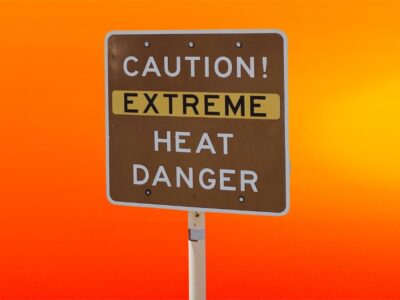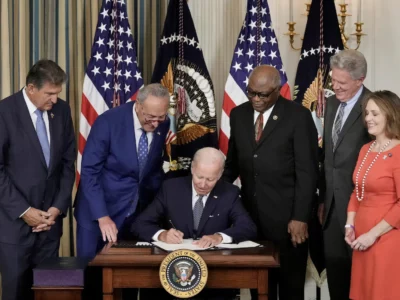Ranking Presidents on Climate Change
Seven presidents, seven very different legacies.
Although a 1977 memo alerted Jimmy Carter to the problem of climate change, the first tentative responses to climate change didn’t emerge until he left the White House. Since then, there have been seven very different men in the White House. You may find the rankings surprising. Here’s how I would rank them, from best to worst: Joe Biden, Barack Obama George H.W. Bush & Bill Clinton (tie) Ronald Reagan George W. Bush Donald Trump If you w...
CONTINUE READINGWe Crossed 1.5 C. Did We Breach the Paris Agreement?
Here’s what the recent rise in global temperature means for international climate targets.
If you’re not a climate scientist—and maybe even if you are—reading news headlines this month has been confounding and a little scary. “In First, Earth’s Temperature Breached Key Threshold Over a 12 Month Period” is how the Wall Street Journal put it. “Earth Just Experienced 12 Months Of Global Temperatures Above Critical 1.5C Climate Threshold,” was the version at Forbes. And the Washington Post went with “Earth Breached a Feared Level of Warming O...
CONTINUE READINGI ♥ IRA
Yes, the IRA has flaws. But it was a really unexpected breakthrough for US climate policy.
Call me eccentric, but this is my Valentine to a federal statute, the Inflation Reduction Act, better known as the IRA. No one really expected IRA to pass. A version of the Green New Deal had passed the House. But the Democrats had only a one-vote margin in the Senate, and that one vote was Joe Manchin. Manchin was (and is) the least liberal Democrat in the Senate. On top of that, he represented West Virginia. That’s a place where coal is still King and Trump ...
CONTINUE READINGThe New Particulate Standard and the Courts
The tough new air quality standard is sure to be challenged in court. Winning the challenges will be tougher.
EPA has just issued a rule tightening the air quality standard for PM2.5 — the tiny particles most dangerous to health — from an annual average of 12 μg/m³ (micrograms per cubic meter) down to 9 μg/m³. EPA estimates that, by the time the rule goes into effect in 2032, it will avoid 4500 premature deaths, 800,000 asthma attacks, and 290,000 lost workdays. Most likely, by the time this post goes up, someone will have filed a lawsuit to overturn the EPA rule....
CONTINUE READINGA New Strategic Plan for California Offshore Wind
The California Energy Commission has published a draft including strategies for impacted communities, but CBAs deserve more emphasis.
For those following offshore wind development in California, January 19, 2024, marked an important moment—the release of the long-awaited Draft Assembly Bill 525 Offshore Wind Strategic Plan from the California Energy Commission (CEC). Some important foundations for offshore wind, a new but growing industry in California, had already been laid. Assembly Bill 525 (AB 525, Chiu, Chapter 231, Statutes of 2021) lent momentum to the development of offshore wind in the state...
CONTINUE READINGClimate Election 2024: “Drill, Baby, Drill” but Then What?
Conservatives have a Trump 2.0 energy policy built on outright lies, some surprising ideas, and risky reversals of America’s clean energy transformation.
If you’ve missed the sound of a crowd shouting “Drill, Baby, Drill” you’re in luck. That chant is back in vogue, as the general election heats up. The 2008-era slogan is shorthand for the Trump campaign’s energy policy, but we know much more about current conservative thinking on the subject thanks to Project 2025, the 920-page transition plan for the next administration by policy strategists from the Heritage Foundation. The right-wing approach to energ...
CONTINUE READINGThe Long Life and Sudden Demise of Federal Wetlands Protection
Here’s a timeline of events.
It's no wonder that one EPA staffer's reaction to the Supreme Court ruling was a single word: "Heartbroken." In 2023, the Supreme Court ended fifty years of broad federal protection to wetlands in Sackett v. United States. It is only when you look back at the history of federal wetland regulation that you realize just how radical and destructive this decision was. For instance, under the Court's reasoning, a Reagan Administration regulation would be considered a blat...
CONTINUE READINGEmmett Institute Symposium: Powering the Future
This is a critical moment in the energy transition for plotting the course of mineral extraction, with communities and the environment in mind.
If you ever find yourself passing through southwest Montana, go visit the Berkeley Pit and contemplate resource extraction. You pay a couple bucks to a guy in a trailer; walk under some razor wire and through a long, disorienting white tunnel; then stand and stare out at the most beautiful turquoise sea of toxic water. You're looking at 50 billion gallons of water laced with arsenic, zinc, lead and copper. This water is about as acidic as stomach acid and s...
CONTINUE READINGClimate Change and “The Chosen One”
The plan of this messianic figure is clear -- expanding fossil fuels and eliminating climate action.
A leading presidential candidate recently reposted a video that called him the “Chosen One,” echoing the view of many of his followers that God has chosen him to lead the country. "And on June 14, 1946," the video tells us, "God looked down on his planned paradise and said, 'I need a caretaker.' So God gave us Trump." What would a victory by the Chosen One in 2024 mean for climate policy? In a speech in December, he said that wanted to be “dictator for a da...
CONTINUE READINGInterstate Pollution and the Supreme Court’s “Shadow Docket”
The Court considers whether to stay an EPA plan in light of changed circumstances.
Later this month, the Supreme Court will hear oral argument about whether to stay a plan issued by EPA to limit upwind states from creating ozone pollution that impacts other states. As I wrote before the Court decided to hear the arguments, the issues here seem less than earthshaking, and for that matter, less than urgent. It was puzzling to me why after many weeks the Court was still sitting on the “emergency” requests of the upwind states to be rescued from the ...
CONTINUE READING












